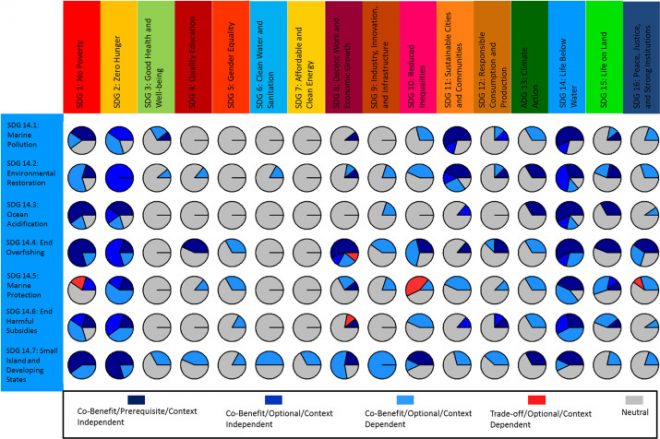In 2015, the United Nations formally established 169 targets pertaining to global sustainability under 17 Sustainable Development Goals (SDGs). The range of themes encompassed by SDGs include reducing poverty and inequalities, promoting sustained economic and infrastructural development, and enhancing environmental sustainability initiatives. It has become apparent that in order to accomplish SDGs and gain insight towards effective policy-making tools, we must consider the relationships established among and between SDGs.
A new paper, ‘A rapid assessment of co-benefits and trade-offs among Sustainable Development Goals‘, has been published in Marine Policy and includes contributions from Nereus Senior Fellow Gerald Singh, Research Associate & Program Manager Andrés M. Cisneros-Montemayor, Alumnus Wilf Swartz, Director of Science William Cheung, Fellow Tiff-Annie Kenny, Principal Investigator Chris McOwen, Alumnus Rebecca Asch, Alumnus Laurens Geffert, Research Associate Colette Wabnitz, Research Associate Rashid Sumaila, Principal Investigator Quentin Hanich, and Director of Policy Yoshitaka Ota. This research focuses on the role the ocean plays in global social-ecological systems.
This study highlights how achieving SDG 14: Life Below Water targets contributes to the accomplishment of other SDGs. Improving the health of our ocean has the potential to boost both social and ecological aspects of our planet. These co-benefits are displayed within a rapid assessment framework that integrates previous knowledge with expert opinion to relay the uniting factors between and among SDGs.

The relationships and compatibility of SDG 14 ocean targets with other SDGs. Image: Figure 2 from ‘A rapid assessment of co-benefits and trade-offs among Sustainable Development Goals.’
Although it is inevitable that achieving SDG 14 targets has the potential to facilitate the accomplishment of other SDGs and that the state of our ocean plays a pivotal role in our social and ecological systems, there is an alarming lack of progress on SDG 14. In order to enhance global sustainability, policy options that consider the impacts that could be felt from ending illegal fishing, protecting marine habitats, and taking action against marine pollution on our societies and ecosystems should be taken into serious consideration.
Abstract
Achieving the United Nations’ 17 Sustainable Development Goals (SDGs) results in many ecological, social, and economic consequences that are inter-related. Understanding relationships between sustainability goals and determining their interactions can help prioritize effective and efficient policy options. This paper presents a framework that integrates existing knowledge from literature and expert opinions to rapidly assess the relationships between one SDG goal and another. Specifically, given the important role of the oceans in the world’s social-ecological systems, this study focuses on how SDG 14 (Life Below Water), and the targets within that goal, contributes to other SDG goals. This framework differentiates relationships based on compatibility (co-benefit, trade-off, neutral), the optional nature of achieving one goal in attaining another, and whether these relationships are context dependent. The results from applying this framework indicate that oceans SDG targets are related to all other SDG goals, with two ocean targets (of seven in total) most related across all other SDG goals. Firstly, the ocean SDG target to increase economic benefits to Small Island Developing States (SIDS) and least developed countries for sustainable marine uses has positive relationships across all SDGs. Secondly, the ocean SDG target to eliminate overfishing, illegal and destructive fishing practices is a necessary pre-condition for achieving the largest number of other SDG targets. This study highlights the importance of the oceans in achieving sustainable development. The rapid assessment framework can be applied to other SDGs to comprehensively map out the subset of targets that are also pivotal in achieving sustainable development.




